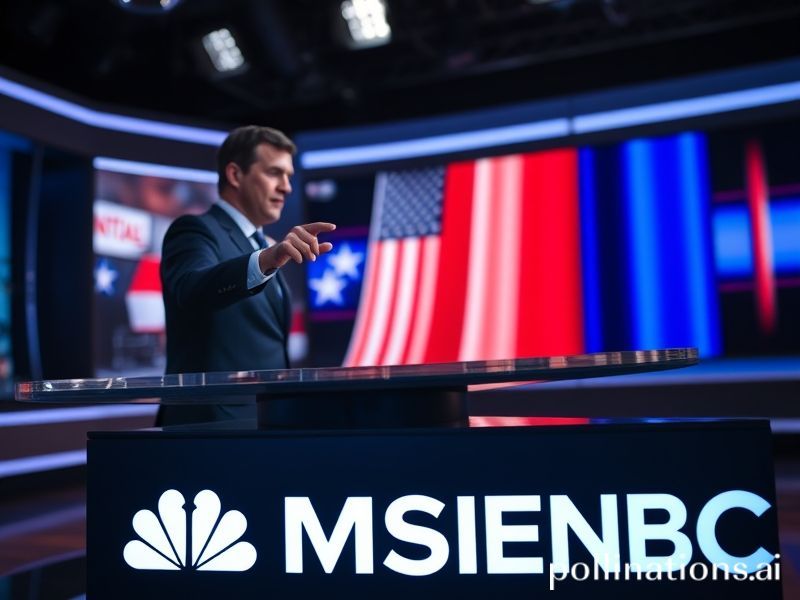MSNBC: The World’s Favorite American Meltdown—Now Streaming with Subtitles
MSNBC: America’s Cable Therapy Session, Exported
An international correspondent’s notebook on the channel that turned partisan outrage into a 24-hour spectator sport—and accidentally became a soft-power export.
The first time I watched MSNBC in a hotel bar in Nairobi, the closed-captioning was in Swahili and the chyron screamed “BREAKING: DEMOCRACY IN PERIL.” The patrons, mostly Kenyan civil servants nursing Tuskers, glanced up only when Rachel Maddow’s eyebrows achieved liftoff. One diplomat chuckled, “Ah, the Americans are having another episode.” In that moment I understood the channel’s true global role: it is less a news network than a serialized nervous breakdown the United States air-drops into foreign living rooms, a prestige drama where the stakes are always existential and the next season renews automatically.
MSNBC began life in 1996 as a Microsoft-NBC joint venture—essentially a dial-up modem in a suit and tie. Back then it aspired to be CNN with better fonts. Instead, after the dot-com bust and a few unfortunate experiments with Michael Savage, it discovered that outrage ages better than venture capital. By the Trump era the brand had sharpened into the Prada of #Resistance media: sleek, pricey-looking, and designed to make the wearer feel morally superior at brunch.
Abroad, the network’s influence is wildly disproportionate to its domestic ratings (which trail Fox News and, on good days, the Hallmark Channel’s yuletide puppies). Yet from Brussels to Bangkok, policy elites treat it as the Rosetta Stone for decoding whatever fresh chaos Washington has brewed. EU commissioners binge “Morning Joe” like it’s a telenovela starring caffeine and hair plugs. South Korean intelligence analysts reportedly clip segments of “Deadline: White House” the way Kremlinologists once parsed May Day photos for who stood next to Brezhnev. The irony, thick enough to spread on toast, is that a channel obsessed with American parochialism has become the planet’s most trusted English-language feed on American parochialism.
This soft-power coup is not without collateral damage. In Latin America, MSNBC’s habit of framing every domestic U.S. debate as a civilizational cliffhanger has convinced more than one foreign ministry that the empire is perpetually three tweets from collapse. The resulting whiplash keeps global markets charmingly bipolar: sell tech stocks when Chris Hayes furrows his brow; buy defense contractors when Nicolle Wallace says “constitutional crisis” twice in one segment.
Meanwhile, authoritarian regimes have reverse-engineered the format. China’s CGTN now produces its own version of liberal sanctimony, complete with a British anchor who looks like he’s been cryogenically frozen since Question Time ’97. Russia’s RT, never subtle, simply hired the actual talent after MSNBC laid them off during the streaming wars. One former contributor told me, over surreptitious Georgian wine, that Kremlin producers instructed him to “keep the moral panic, lose the commercial breaks.” Fair enough: oligarchs don’t need Cialis sponsors.
The channel’s global footprint also reveals the absurd asymmetry of American self-absorption. When floods swallowed whole provinces in Pakistan last year, MSNBC allotted them 43 seconds—just after a segment titled “Why Biden’s Dog Might Be a National Security Risk.” Pakistani viewers, accustomed to this hierarchy, now time their snack breaks accordingly. A Lahore journalist confessed he watches exclusively for the weather maps: “They show the jet stream, and we learn whether our monsoon is collateral damage in a climate story they’ll never name.”
Of course, the network’s biggest export remains its business model. Subscription streaming services from Sweden to South Africa have cloned the formula: partisan hosts, dramatic stings, and the promise that if you just keep watching, the other side will finally be held accountable. Viewers, it turns out, will pay handsomely to have their cortisol levels managed by strangers in good lighting.
As I filed this dispatch from a rooftop in Istanbul—where the call to prayer mingled with a stray Wi-Fi signal labeled “MuellerTime5G”—MSNBC played silently in the hotel lobby. The screen showed a countdown clock to the next congressional hearing. A German tourist asked the bartender if the numbers were for a rocket launch. “Sort of,” I said. “It’s American democracy. Same combustibles, less predictable trajectory.”
Conclusion: MSNBC may bill itself as “This Is Who We Are,” but for the rest of the planet it’s more like “This Is Who You Are Today—Check Back Tomorrow for Updates.” In an age when empires decline and algorithms rise, the channel has achieved the rare feat of turning civic anxiety into binge-worthy content and then shipping it abroad with subtitles. Call it globalization’s guilty pleasure: the opium of the pundit classes, conveniently pre-cut with commercial breaks.







